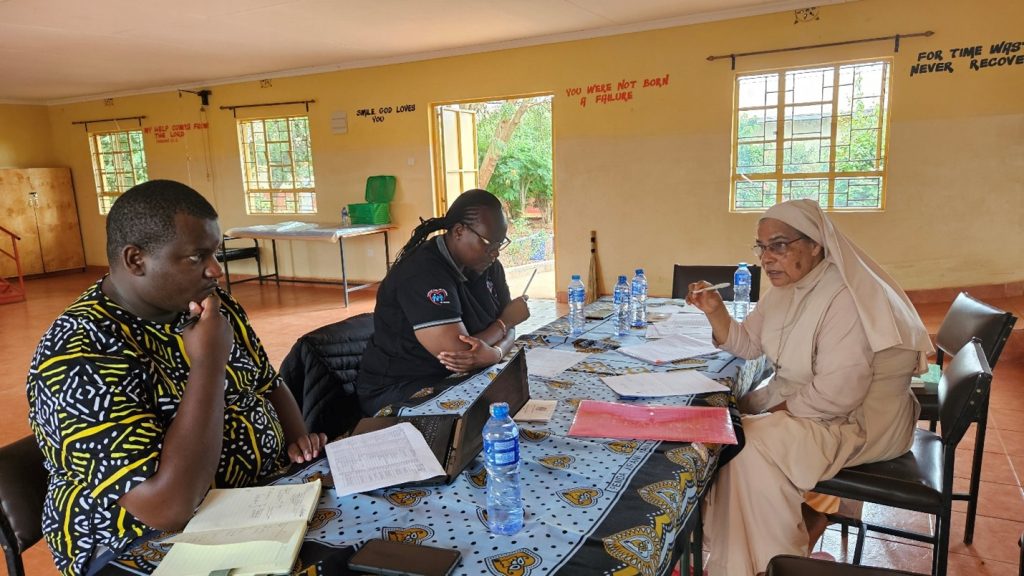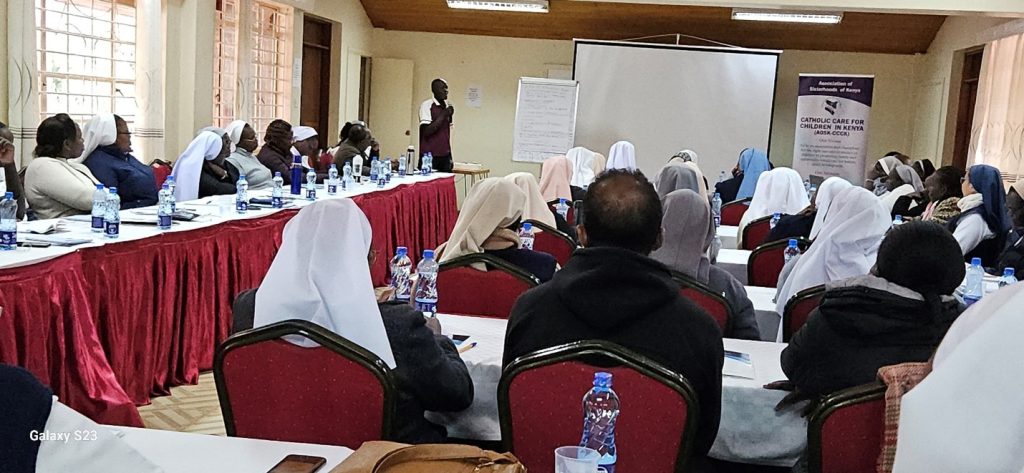The Care Reform Journey of the Association of Sisterhoods of Kenya – Catholic Care for Children in Kenya (AOSK-CCCK): 2018–2024

Figure 1:AOSK Chair, Executive secretary, GHR Global senor Officers Dan and Kathleen and AOSK staff in 2018 after the foundation of AOSK-CCCK Program
Since 2018, the Association of Sisterhoods of Kenya (AOSK) has spearheaded a transformative care reform journey through its Catholic Care for Children in Kenya (CCCK) program. Gro.unded in its mission to uphold family- and community-based care for children, AOSK-CCCK strives to align with the charism of care upheld by religious congregations across Kenya. Despite challenges, the program has achieved remarkable milestones, thanks to the unwavering commitment of religious women (Catholic sisters) and collaborators.
In 2018, AOSK recognized its significant role in child care as Catholic institutions accounted for 146 Charitable Children Institutions (CCIs), with 78 managed directly by Catholic Sisters. A baseline survey revealed that, of the 10,599 children

Figure 2:Mr. Joseph Wichenje Case Manager, Sr. Delvin Mukhwana program manager and sister administrator of Fatima children Home Marsabit on their support field visit to CCI
under Catholic care in 2019, 5,546 were in residential institutions. While these facilities provided critical services, they posed risks such as weakened family bonds and potential rights violations, including the right to parental care.
Driven by the need for a more holistic approach, AOSK embarked on reforming its sustainable children rights, protection and post Institutional care model. The goal was to transition from institutional care to family and community – centric support, fostering environments where children could thrive within their families or alternative care arrangements. The transition to care reform faced initial resistance, especially among congregations whose charism centered on caregiving. However, through consistent advocacy, sensitization, and capacity-building initiatives, AOSK gradually won hearts and minds. Sensitization programs reached bishops at regional and national levels,

Figure 3:CCI Administrators during a care reform training on child community welfare program me and their guidelines in Nairobi
along with 176 congregational superiors. Over 2,612 sisters were trained in care reforms, safeguarding, and positive parenting. Since 2018, 29,483 community members have been sensitized on care reform and parenting principles. Partnerships with the government and organizations such as AMECEA, SPOON, UEFA, and CCCI have further enhanced the program’s impact.
AOSK-CCCK focused on empowering sisters and administrators with specialized skills. This included 39 sisters earning degrees, diplomas and certificates in social work, 24 trained in integrative psycho-spiritual counseling, and 46 sisters trained as safeguarding officers from 27 catholic dioceses of Kenya, equipped to protect minors and vulnerable adults as a means of gatekeeping. Tailored training was also provided to CCI administrators on disability care, proposal writing, and resource mobilization.
The program successfully integrated safeguarding principles into congregational and institutional frameworks, including the development of child protection and vulnerable adult safeguarding policies (AOSK CPVASP). Sixty AOSK staff and 47 congregations were trained to adopt safeguarding practices, and case management in CCIs was digitalized for improved efficiency.
Reintegration of children remains a cornerstone of care reform, with 4,461 children reunited with their families between 2018 and 2024. The program has also put a lot of effort in emphasizing the reintegrating of children living with disabilities to ensure inclusive care solutions.
CCIs have begun transitioning their infrastructure toward community child welfare-focused initiatives, reflecting a shift from institutionalization to family-strengthening activities. For instance, Divine Mercy Children’s Home in Homa Bay reintegrated all children back to their families and transitioned the home into a school.
AOSK celebrates a significant reduction in reliance on institutional care, improved case management processes, and success stories that amplify the impact of care reforms. Increased awareness among congregations about the importance of family-based care, recognition from entities such as KCCB and CRS, and integration of care reforms into evangelization efforts in the AMECEA region are among the program’s notable achievements.
Despite progress, the journey has faced challenges such as limited government support, financial constraints in reintegrating children, frequent transfers of trained personnel, and duplication of efforts by partners, which led to resource inefficiencies.
AOSK-CCCK extends heartfelt gratitude to the GHR Foundation for its generous support in bringing this vision to life. The dedication of the AOSK CCCK staff, AOSK governing council, UISG-CCCI, AOSK member congregations and like-minded organizations has been instrumental in driving care reforms forward.
As the care reform journey continues, AOSK remains committed to ensuring that every child experiences the love, stability, and dignity they deserve within a supportive family or community. By addressing challenges and embracing collaboration, AOSK-CCCK reaffirms its mission to promote holistic care in alignment with the Gospel’s call to serve the vulnerable.

